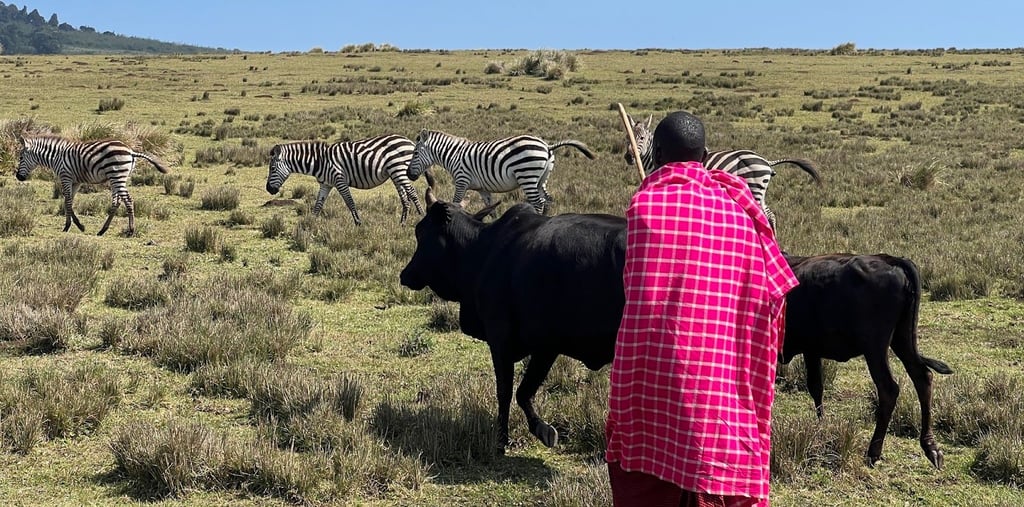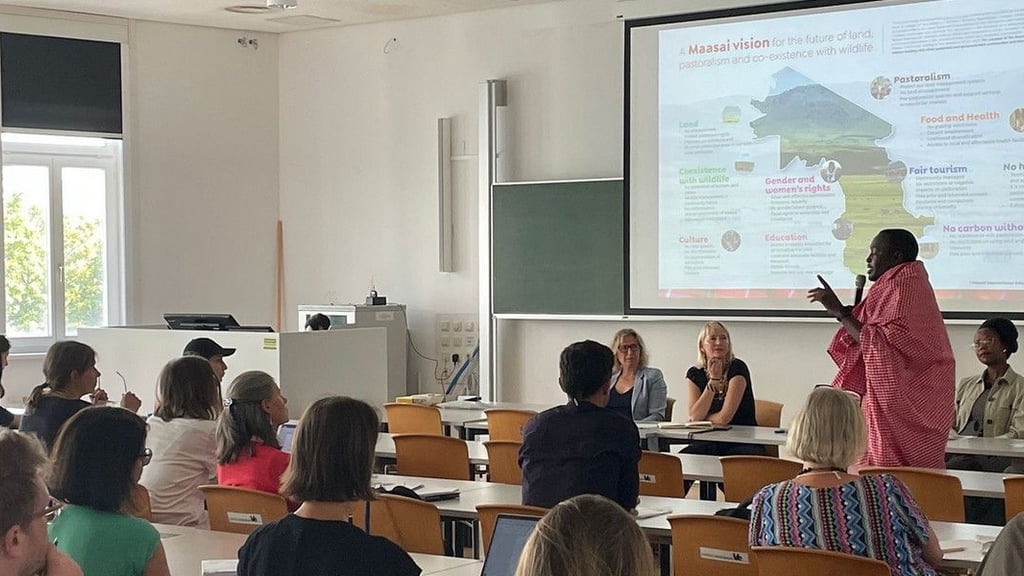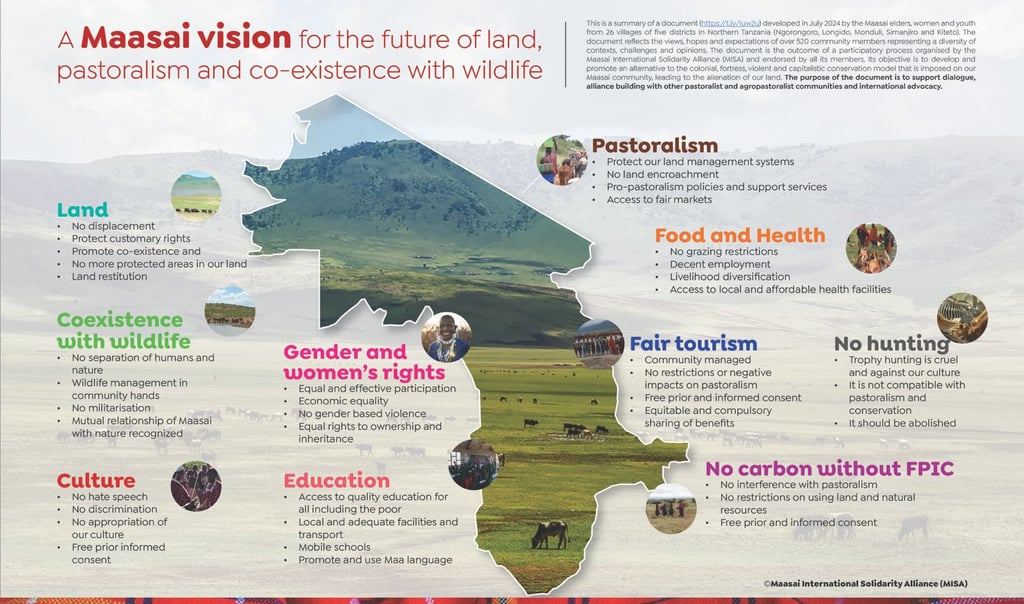A Maasai vision for the future of land, pastoralism and co-existence with wildlife
In our vision for the future of land, pastoralism and co-existence with wildlife, we present the views, hopes and expectations of over 520 community members representing a diversity of contexts, challenges and opinions. This vision is the outcome of a participatory process we organised, involving women, youth, traditional leaders, and community representatives. It has been endorsed by all the members of our Maasai International Solidarity Alliance (MISA).
The document identifies not only challenges to this vision but also potential solutions. These challenges include negative stereotypes of the Maasai way of life, structural inequality, trophy hunting, unfair tourism practices and a lack of Free, Prior and Informed Consent (FPIC) in carbon credit negotiations.
The purpose of this document is to support dialogue, alliance building with other pastoralist and agropastoralist communities and international advocacy.
MISA critique of the Wildlife Management Area (WMA) model
MISA response to the Tanzanian government’s false narratives about the Maasai
OUR CONSERVATION VISION
The concept of WMAs emerged from Tanzania's Wildlife Policy of 1998, which aimed for a comprehensive approach to wildlife conservation and management outside core protected areas. It has been argued that the core idea behind WMAs was to empower local communities by granting them control over wildlife management in these areas. This devolution of power was intended to create an incentive for our communities to sustainably manage wildlife, as we would directly benefit from the resources. International donors and conservation organisations played a key role in promoting WMAs.
Contrary to that popular version, we demonstrated that WMAs have a critical negative impact on local communities and particularly on pastoralists. Control over land use and resources is not in the hands of local communities, as it was intended to be. In addition, it was also intended that WMAs would play a role in alleviating poverty, but very little of the generated revenue reaches communities.
Trophy hunting, the main “business” of WMAs, not only does not contribute to poverty alleviation nor animal welfare, but it also leads to violent conflicts and human rights violations.
In this document, we respond to the Tanzanian government propaganda claiming that there are no Indigenous Peoples in Tanzania. We react point by point to a document titled "A rebuttal of claims about the so-called indigenous peoples in Tanzania" published by the Tanzanian government on 21 April 2023. Our response addresses 14 false claims made in the document and presents solid counterarguments to these false narratives, which negatively impact the human rights of the Maasai people in Tanzania. While Tanzania does not recognize the concept of Indigenous Peoples in Tanzania, the African Commission on Human and People's Rights has endorsed the indigenous status of the hunter-gatherer groups Akiiye and Hadzabe and the pastoralist groups Barabaig and Maasai. We demand that our rights as Indigenous Peoples be respected.
We call for a decolonial conservation vision, one that is grounded in Indigenous Peoples’ rights, social justice and co-existence with nature. Our objective is to promote an alternative to the colonial, fortress, violent and capitalistic conservation model that is imposed on our Maasai community, leading to the alienation of our land. Our conservation vision highlights the coexistence between the Maasai people, our livestock and wildlife as an alternative to the separation of humans from nature. It calls for staying on the land and preserving the Maasai pastoralist culture.
ADDITIONAL RESOURCES
MISA’s policy brief on reshaping biodiversity finance
In this policy brief, we explain why the growing interest in biodiversity offsetting, crediting, and related trading schemes is a source of concern for us Indigenous Peoples. While these mechanisms aim to fund biodiversity protection, they are modelled after flawed carbon markets and outdated conservation approaches. Instead of redirecting harmful subsidies from industries like fossil fuels and industrial agriculture, these schemes commodify nature, leading to land grabbing and greenwashing. This is not a viable solution for true biodiversity protection.


No to Trophy Hunting
We are against trophy hunting in principle. We do not kill nor eat wildlife. We have a conviction that trophy hunting is segregative between the rich/trophy hunters and the poor/poachers. While the rich are eulogized as conservation heroes, the poor are arrested and prosecuted for not being able to pay to become trophy hunters. We are against the killing of wildlife.
Many of our grazing areas have been encroached upon by hunting areas in the form of Game Controlled Areas (GCA) or Wildlife Management Areas (WMA). The appropriation of large tracts of land by external actors or investments has disrupted pastoral routes and access to key resources. Hunting areas are often declared off-limits with little consultation or by scaring herders away, further shrinking the space available for pastoralist livelihoods. The areas that we are constantly displaced from without notice are turned into wildlife killing fields. They call it trophy hunting to normalize its ugliness. We oppose it.
We were colonised by the Germans (1886-1918) and the British (1918-1961). One of the key outcomes of colonisation was the introduction of hunting and national parks that separate humans and nature. This colonial vision of conservation is still prevalent today in the form of fortress conservation and evictions for tourism. For us, the post-independence Tanzanian government model of conservation has been as bad as its colonial predecessors' thinking. But never before has this model of conservation been as terribly executed against us as from 2021 to date. MISA has risen to fight these injustices.


MISA representative presents the Maasai conservation vision at the Tropentag workshop organized by University of Natural Resources and Life Sciences, Vienna (BOKU), Austria, on 11 September 2024. Credit: MISA.


Livestock herd grazing alongside wildlife, featuring the co-existence we promote. Credit: MISA.
Infographic showing the 10 dimensions of our Maasai conservation vision. Credit: MISA.
Why we Need Pro-Pastoralist Policies
This research report (September 2025) explores the importance of pastoralism in Eastern Africa and identifies the main challenges facing pastoralists. It is co-signed by 4 global networks (AFSA, CELEP, MISA and CIDSE) and endorsed by the Eastern & Southern Africa (ESA) International Regional Support Group (IRSG) of the International Year of Rangelands and Pastoralists 2026. It presents a collective vision for pastoralists’ future and seven measures that African states and the EU can implement to support pastoralism.
Research Report:
Policy Brief:
.
Listen to the recording of the launch event:
MISA rejects statement of Frankfurt Zoological Society
In this statement, MISA rejects the press release issued by Frankfurt Zoological Society (FZS) on 20 September 2025 as it presents distorted and incorrect information. MISA also condemns the appointment of a lead lobbyist for trophy hunting as new head of the FZS
Tanzania. Over the past three years, MISA tried to engage with FZS to change their problematic approach to conservation in the greater Serengeti ecosystem in northern Tanzania. The latest exchange took place in September 2025 at FZS headquarter in Frankfurt, Germany. This document establishes the truth on FZS’s role and calls on FZS to stop its conservation work in Maasai land.

